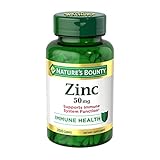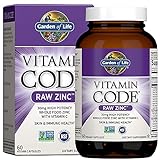Table of Contents
Foods rich in zinc: There are plant-based foods such as wheat germ, sesame, nuts, and legumes exceeding all animal-based foods, except for the oyster. With a healthy diet based on plant-based foods, there is no risk of significantly suffering a lack of zinc if one eats wheat germ and sesame.
Chemical composition: Minerals are considered trace elements because they are necessary only in minimal amounts, as are other minerals such as iron.
- Immune Support Supplement: Zinc supports the body’s natural defense system; aids immune system function, wound healing, and the absorption of B vitamins*
- Metabolism Support: Zinc supports the digestion and metabolism of important vitamins, minerals, carbohydrates, and other essential nutrients*
- Zinc Picolinate Supplements: These zinc capsules support normal fetal and reproductive development*
Zinc-rich foods: Among animal-based foods, only oysters are at the top of the list as a rich zinc source. Wheat germ, sesame, maple sugar, oil-bearing nuts, and legumes are all zinc-rich foods for vegetarians that equal or exceed the amount of zinc in meat and cured cheeses.

Foods rich in zinc absorption rate: Although there are many zinc-rich vegetables, some of their components inhibit its absorption and that of other minerals:
- Phytates in whole grains,
- Oxalates in some green leafy vegetables such as spinach,
- Vegetable fiber.

This interference with the absorption of minerals is only of concern if one regularly consumes large amounts of bran, whole-grain cereals, or other fiber-rich foods. Despite this, obtaining sufficient zinc with a healthy vegan diet is possible.

Function: Most of the body’s zinc is found in the skin, the hair, the nails, and the prostate. It is involved in numerous chemical reactions within the body since it forms part of various enzymes. Its two most evident functions are:
- Sustaining the skin, hair, and nails in good condition;
- Development and functioning of the reproductive organs.
Zinc deficiency symptoms: Retardation of physical growth, poor wound healing, lack of development of the gonads (testicles or ovaries).
Increased need: Excess fiber consumption, pregnancy, nursing.
Loss during the processing of foods: Very slight.
Foods Rich in Zinc: Foods Chart

Frequently Asked Questions
What are some lesser-known benefits of zinc beyond immune function and wound healing?
1. Brainpower: Zinc plays a role in neurotransmitter production and synaptic function, potentially impacting memory, learning, and cognitive decline. Studies suggest it may benefit conditions like Alzheimer’s and Parkinson’s.
2. Cellular Defense: Zinc’s antioxidant properties help combat free radical damage, potentially reducing chronic disease risk and promoting healthy aging.
3. Eye Health: The macula has a high concentration of zinc, which protects against age-related macular degeneration and visual loss.
4. Reproductive Health: Zinc is crucial for testosterone production and sperm quality in men and fetal development and egg quality in women.
5. Blood Sugar Control: Zinc may improve insulin sensitivity and glucose metabolism, potentially benefiting diabetes management.
How does zinc absorption differ between plant and animal sources?
Animal sources (meat, seafood) offer readily absorbed heme zinc, while plant sources (beans, nuts, seeds) contain phytate, which can hinder absorption.
Grain and legume fermentation, sprouting, and soaking can increase the zinc bioavailability from plant sources.
Consuming vitamin C alongside plant-based zinc sources can also enhance absorption.
Are there any specific dietary needs or conditions that increase zinc requirements?
Vegetarians and vegans may need to pay closer attention to zinc intake due to lower bioavailability from plant sources.
Pregnant and breastfeeding women, children, and older adults have higher zinc needs due to specific physiological demands.
Celiac disease, Crohn’s disease, and chronic kidney disease can impair zinc absorption, necessitating increased dietary intake or supplementation.
What potential risks or interactions are associated with high zinc intake?
Excessive zinc intake (over 40mg/day) can interfere with copper absorption, leading to copper deficiency.
High doses of zinc supplements can also cause nausea, vomiting, and stomach cramps.
Before consuming zinc supplements, it is important to get the advice of a healthcare practitioner, particularly if you are already taking specific prescriptions or have pre-existing health concerns.
Are there any emerging research areas regarding zinc and its potential benefits?
Research is ongoing regarding zinc’s role in managing mental health conditions like depression and anxiety.
Its potential to combat antibiotic resistance and support gut health is also being explored.
Additionally, the synergy between zinc and other micronutrients in optimizing overall health is a promising area of investigation.
DISCLAIMER: All content on this website is presented solely for educational and informational objectives. You should not rely on the information provided as a replacement for advice, diagnosis, or treatment from a qualified medical expert. If you are pregnant, nursing, or have any preexisting medical concerns, you should talk to your doctor before using any herbal or natural medicines.
REFERENCES
- George D. Pamplona-Roger, M.D. “Encyclopedia of Foods and Their Healing Power.” George D. Pamplona-Roger, M.D. Encyclopedia of Foods and Their Healing Power. Trans. Annette Melgosa. Vol. 1. Chai Wan: Editorial Safeliz, 2005. 403. Print. [Foods rich in zinc]
- National Institutes of Health Office of Dietary Supplements: https://ods.od.nih.gov/factsheets/Zinc-HealthProfessional/
- Academy of Nutrition and Dietetics: https://www.eatright.org/
- Linus Pauling Institute – Oregon State University: https://lpi.oregonstate.edu/mic
- World Health Organization: https://www.who.int/tools/elena/bbc/zinc-pneumonia-children
- Scientific review articles on specific aspects of zinc, such as its role in brain health, eye health, and blood sugar control (accessed through PubMed and Google Scholar).
Last update on 2024-07-23 / Affiliate links / Images from Amazon Product Advertising API





